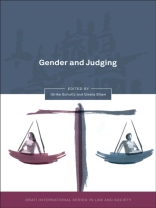Does gender make a difference to the way the judiciary works and should work? Or is gender-blindness a built-in prerequisite of judicial objectivity? If gender does make a difference, how might this be defined? These are the key questions posed in this collection of essays, by some 30 authors from the following countries; Argentina, Cambodia, Canada, England, France, Germany, India, Israel, Italy, Ivory Coast, Japan, Kenya, the Netherlands, the Philippines, South Africa, Switzerland, Syria and the United States. The contributions draw on various theoretical approaches, including gender, feminist and sociological theories.
The book”s pressing topicality is underlined by the fact that well into the modern era male opposition to women”s admission to, and progress within, the judicial profession has been largely based on the argument that their very gender programmes women to show empathy, partiality and gendered prejudice – in short essential qualities running directly counter to the need for judicial objectivity. It took until the last century for women to begin to break down such seemingly insurmountable barriers. And even now, there are a number of countries where even this first step is still waiting to happen. In all of them, there remains a more or less pronounced glass ceiling to women”s judicial careers.
Akad Oberratin Ulrike Schultz & Professor Gisela Shaw
Gender and Judging [PDF ebook]
Gender and Judging [PDF ebook]
Mua cuốn sách điện tử này và nhận thêm 1 cuốn MIỄN PHÍ!
định dạng PDF ● Trang 640 ● ISBN 9781782251101 ● Biên tập viên Akad Oberratin Ulrike Schultz & Professor Gisela Shaw ● Nhà xuất bản Bloomsbury Publishing ● Được phát hành 2013 ● Có thể tải xuống 3 lần ● Tiền tệ EUR ● TÔI 5761786 ● Sao chép bảo vệ Adobe DRM
Yêu cầu trình đọc ebook có khả năng DRM












